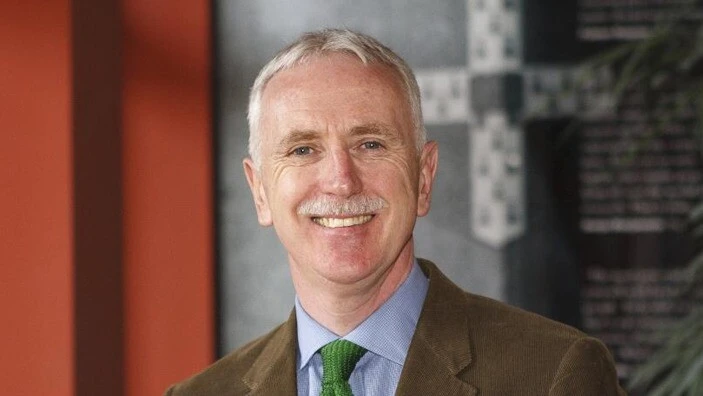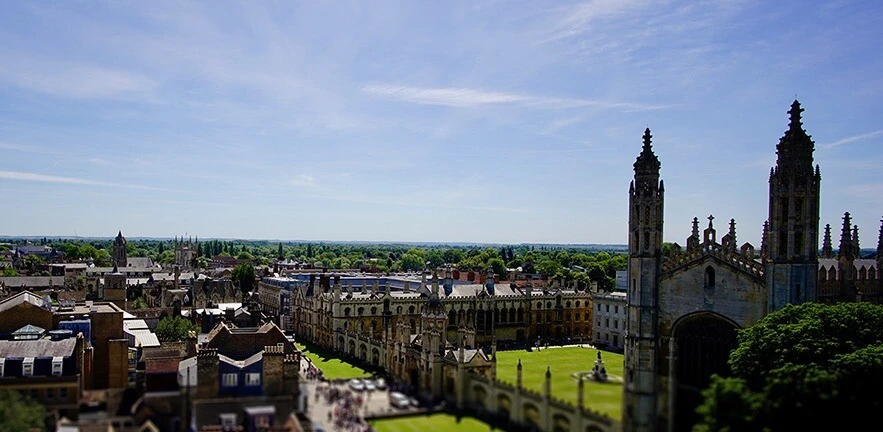Invesco Professor of Financial History
Founder and Co-Director of the Centre for Endowment Asset Management (CEAM)
Fellow of Clare College
BA (University of Oxford), MSc (London Business School), MSc and PhD (London School of Economics)
My research interests include financial history and asset management, in particular, long horizon investing. I have published in the top journals in finance and economic history and my research has been widely covered by the media. I am particularly known for my research on the investing of John Maynard Keynes.
I am a member of the Finance subject group at Cambridge Judge Business School, which focuses on the investment and financial decisions of firms and financial institutions, and a Research Fellow at the Centre for Economic Policy Research (CEPR).

Professional experience
Professor Chambers is Founder and Co-Director of the Centre for Endowment Asset Management at Cambridge Judge Business School, and a Research Fellow at the Centre for Economic Policy Research. He is a Fellow of Clare College, Cambridge and of the Royal Historical Society. Currently a Visiting Professor in Economic History at LSE, he previously sat on the Editorial Board of the Financial Analysts Journal. Prior to returning to full-time education in 2001, Professor Chambers worked for 20 years in investment banking and asset management in Europe, Japan and the United States.
Previous appointments
Professor Chambers was a post-doctoral research fellow in the Department of Economics, University of Oxford, from 2005 to 2008, and taught on the Masters in Financial Economics and the MBA programmes at Saïd Business School, University of Oxford.
Publications
Publications
- Chambers, D., Dimson, E., Ilmanen, A. and Rintamakki, P. (2024) “Long-run asset returns.” Annual Review of Financial Economics, 16: 435-458 (DOI: 10.1146/annurev-financial-082123-105515)
- Chambers, D., Spaenjers, C. and Steiner, E. (2021) “The rate of return on real estate: long-run micro-level evidence.” Review of Financial Studies, 34(8): 3572-3607 (DOI: 10.1093/rfs/hhab028)
- Accominotti, O., Cen, J., Chambers, D. and Marsh, I.W. (2019) “Currency regimes and the carry trade.” Journal of Financial and Quantitative Analysis, 54(5): 2233-2260 (DOI: 10.1017/S002210901900019X)
- Chambers, D., Schill, M. and Sarkissian, S. (2018) “Market and regional segmentation and risk premia in the first era of financial globalization.” Review of Financial Studies, 31(10): 4063-4098 (DOI: 10.1093/rfs/hhx143) (also available online via the SSRN)
- Chambers, D., Dimson, E. and Foo, J. (2015) “Keynes the stock market investor: a quantitative analysis.” Journal of Financial and Quantitative Analysis, 50(4): 843-868 (DOI: 10.1017/S0022109015000186) (available online via the SSRN)
- Chambers, D. and Dimson, E. (2009) “IPO underpricing over the very long-run.” Journal of Finance, 64(3): 1407-1443 (DOI: 10.1111/j.1540-6261.2009.01468.x)
Journal articles
- Chambers, D., Dimson, E., Ilmanen, A. and Rintamakki, P. (2024) “Long-run asset returns.” Annual Review of Financial Economics, 16: 435-458 (DOI: 10.1146/annurev-financial-082123-105515)
- Atta-Darkua, V., Chambers, D., Dimson, E., Ran, Z. and Yu, T. (2021) “Practical applications of strategies for responsible investing: emerging academic evidence.” Practical Applications, 8(4): 1-8 (DOI: 10.3905/pa.8.4.421)
- Chambers, D., Dimson, E. and Ilmanen, A. (2021) “The Norway model in perspective.” Journal of Portfolio Management, 47(5): 178-187 (DOI: 10.3905/jpm.2021.1.230)
- Chambers, D., Spaenjers, C. and Steiner, E. (2021) “The rate of return on real estate: long-run micro-level evidence.” Review of Financial Studies (DOI: 10.1093/rfs/hhab028) (published online Mar 2021) (available online via the SSRN)
- Atta-Darkua, V., Chambers, D., Dimson, E., Ran, Z. and Yu, T. (2020) “Strategies for responsible investing: emerging academic evidence.” Journal of Portfolio Management, 46(3): 26-35 (DOI: 10.3905/jpm.2020.46.3.026)
- Chambers, D., Dimson, E. and Kaffe, C. (2020) “Seventy-five years of investing for future generations.” Financial Analysts Journal, 76(4): 5-21 (DOI: 10.1080/0015198X.2020.1802984)
- Chambers, D., Dimson, E. and Quigley, E. (2020) “To divest or to engage? A case study of investor responses to climate activism.” The Journal of Investing, 29(2): 10-20 (DOI: 10.3905/joi.2020.1.114)
- Chambers, D., Dimson, E. and Spaenjers, C. (2020) “Art as an asset: evidence from Keynes the collector.” Review of Asset Pricing Studies, 10(3): 490–520 (DOI: 10.1093/rapstu/raaa001)
- Chambers, D. and Saleuddin, R. (2020) “Commodity option pricing efficiency before Black, Scholes, and Merton.” Economic History Review, 73(2): 540-564 (DOI: 10.1111/ehr.12935)
- Accominotti, O., Cen, J., Chambers, D. and Marsh, I.W. (2019) “Currency regimes and the carry trade.” Journal of Financial and Quantitative Analysis, 54(5): 2233-2260 (DOI: 10.1017/S002210901900019X)
- Chambers, D., Schill, M. and Sarkissian, S. (2018) “Market and regional segmentation and risk premia in the first era of financial globalization.” Review of Financial Studies, 31(10): 4063-4098 (DOI: 10.1093/rfs/hhx143) (also available online via the SSRN)
- Accominotti, O. and Chambers, D. (2016) “If you’re so smart: John Maynard Keynes and currency speculation in the interwar years.” Journal of Economic History, 76 (2): 342-386 (DOI: 10.1017/S0022050716000589)
- Chambers, D. and Dimson, E. (2016) “The master’s choice.” London Business School Review, 27(2): 38-39 (DOI: 10.1111/2057-1615.12117)
- Chambers, D. and Kabiri, A. (2016) “Keynes and Wall Street.” Business History Review, 90(4): 301-328 (DOI: 10.1017/S0007680516000362)
- Chambers, D. and Dimson, E. (2015) “The British origins of the US endowment model.” Financial Analysts Journal, 71(2): 10-14 (DOI: 10.2469/faj.v71.n2.7) (available online via the SSRN)
- Chambers, D., Dimson, E. and Foo, J. (2015) “Keynes the stock market investor: a quantitative analysis.” Journal of Financial and Quantitative Analysis, 50(4): 843-868 (DOI: 10.1017/S0022109015000186) (available online via the SSRN)
- Burhop, C., Chambers, D. and Cheffins, B.R. (2014) “Regulating IPOs: evidence from going public in London, 1900-1913.” Explorations in Economic History, 51: 60-76 (DOI: 10.1016/j.eeh.2013.07.003)
- Chambers, D. and Esteves, R. (2014) “The first global emerging markets investor: Foreign & Colonial Investment Trust 1880-1913.” Explorations in Economic History, 52: 1-21 (DOI: 10.1016/j.eeh.2013.08.004)
- Chambers D. and Dimson E. (2013) “Retrospectives: John Maynard Keynes, investment innovator.” Journal of Economic Perspectives, 27(3): 213-228 (available online via the SSRN)
- Cheffins, B.R, Koustas D.K. and Chambers, D. (2013) “Ownership dispersion and the London Stock Exchange’s ‘two-thirds rule’: an empirical test.” Business History, 55(4): 667-690 (DOI: 10.1080/00076791.2012.741969) (available online via the SSRN)
- Chambers, D., Dimson, E. and Ilmanen, A. (2012) “The Norway model.” Journal of Portfolio Management, 38(2): 67-81 (DOI: 10.3905/jpm.2012.38.2.067)
- Mitchell, B., Chambers, D. and Crafts, N. (2011) “How good was the profitability of British railways, 1870-1912?” Economic History Review, 64(3): 798-831 (DOI: 10.1111/j.1468-0289.2010.00550.x)
- Chambers, D. (2010) “Going public in interwar Britain.” Financial History Review, 17(1): 51-71 (DOI: 10.1017/S0968565009990163)
- Chambers, D. (2009) “Gentlemanly capitalism revisited: a case study of the underpricing of initial public offerings on the London Stock Exchange, 1946-86.” Economic History Review, 62(1): 31-56
- Chambers, D. and Dimson, E. (2009) “IPO underpricing over the very long-run.” Journal of Finance, 64(3): 1407-1443 (DOI: 10.1111/j.1540-6261.2009.01468.x)
Book chapters
- Chambers, D., Dimson, E. and Foo, J. (2015) “Keynes, King’s and endowment asset management.” In: Brown, J.R. and Hoxby, C.M. (eds.) How the financial crisis and great recession affected higher education: National Bureau of Economic Research Conference Report. Chicago, IL: University of Chicago Press, pp.127-150
Working papers
- Accominotti, O. and Chambers, D. (2014) “Out-of-sample evidence on the returns to currency trading.” Centre for Economic Policy Research Discussion Papers, No.DP9852. London: Centre for Economic Policy Research. (Also available online via the SSRN)
- Chambers, D., Sarkissian, S. and Schill, M.J. (2012) “Market and regional segmentation and risk premia in the first era of financial globalization.” Social Science Research Network Working Paper.
Awards and honours
- Best Paper in Asset Pricing and Investments Award (for “Currency regimes and the carry trade” with Olivier Accominotti, Jason Cen and Ian Marsh), FMA European Conference, 2018
- Cambridge Judge Business School Teaching Award, 2017
- Financial Analysts Journal Graham & Dodd Best Perspectives Award (for the paper “The British origins of the endowment model, with Elroy Dimson), 2015
- Keynes Fellowship, University of Cambridge, 2013
- “The Norway Model” voted ‘Outstanding Article’ by the readers of the Journal of Portfolio Management (with Elroy Dimson and Antti Ilmanen), 2013
- Thomas K. McCraw Fellow, Harvard Business School, Fall 2012
- Ashton Prize for the best article in the last two years by an early career researcher published in The Economic History Review (for “Gentlemanly capitalism revisited”), 2011
- Coller Institute of Private Equity Research Award, 2007
- Economic History Society New Researcher Prize, 2005
News and insights
Governance, economics and policy
Put your resources to work: strategies for business success
Change is the very nature of business – especially successful businesses. Times change, customer needs change and the attractiveness of different market sectors change over time. Effective allocation of resources is essential to meet the demands of such change, finds research at Cambridge Judge Business School.
Insight
Not as rosy
Study of four Cambridge and Oxford Colleges co-authored at Cambridge Judge Business School shows that long-term property investment is less profitable than previously thought.
Insight
Over the horizon
University endowments use their long-term perspective to invest countercyclically at times of stock-market crisis, says new study at the Centre for Endowment Asset Management at Cambridge Judge Business School.
Media coverage
Live Wire | 21 July 2021
Keynes as investor-speculator
A study on John Maynard Keynes’ investment returns co-authored by Dr David Chambers, Reader in Finance and Academic Director of the Centre for Endowment Asset Management (CEAM) at Cambridge Judge Business School, and Professor Elroy Dimson, Chairman of the CEAM, is quoted in the article. The study found that “Keynes’s returns were extraordinary.”
Financial Times | 5 May 2021
Lessons in investing from John Maynard Keynes
A study on John Maynard Keynes as stock market investor co-authored by Professor Elroy Dimson, Dr David Chambers and Justin Foo is featured in the Financial Times. The study looked at Keynes’ stock and provides “a unique record of realized performance and sheds light on how equity focussed investing developed historically.”
Bloomberg | 17 March 2021
Keynes was right. About buying property, at least
Real estate investment is riskier than it looks, says the latest research co-authored by Dr David Chambers, Invesco Reader in Finance at Cambridge Judge Business School. The study of 4 Cambridge and Oxford Colleges shows that long-term property investment is less profitable than previously thought.
The Economist, 22 January 2021
Property investment: some hard truths
MarketWatch, 13 October 2020
Opinion: Ivy League colleges shun Warren Buffett’s advice
WE Wealth, 2 October 2020
Famous collections: Keynes and the art of investing
The Economist,
Lessons from the endowment model
Bloomberg, 28 September 2020
Endowments’ hedge fund bet has long-term advantage
The Telegraph, 22 July 2020
How to invest like… John Maynard Keynes
Cambridge Independent, 28 February 2020
From Hollywood ‘logic’ to ‘highly institutionalised myths’ of the workplace
Bloomberg, 6 February 2020
Invest in art or stocks? Keynes has an answer (well, sort of)
The Times, 31 January 2020
John Maynard Keynes’s art collection yields a stunning return
Bloomberg, 7 August 2019
Carry on like nothing really matters. Until it does
The Wall Street Journal, 30 March 2018
What it takes to build a $100 million art collection
Cambridge Business Magazine, 1 April 2017
Don’t panic!
Financial Times, 11 February 2017
The importance of bubbles that did not burst
The Economist, 8 February 2017
Bubbles are rarer than you think
The National, 31 December 2016
Keynes’ words of wisdom remain relevant for 2017
The Wall Street Journal, 14 October 2016
John Maynard Keynes: Courage is the key for investing
Cambridge News, 15 March 2016
Keynes and the US universities’ money
The Financial, 10 March 2016
Finance experts receive Graham & Dodd Award
Cambridge Business Magazine, 1 March 2016
Keynes struggled as a currency trader
Forbes, 22 January 2016
Why currency trading is a bad idea: Keynes
Bloomberg View, 15 January 2016
FX traders, take heart: Even Keynes lost his shirt
The Times, 13 January 2016
Big Short put Keynes on the brink of bankruptcy
The Guardian, 12 January 2016
John Maynard Keynes ‘a great economist but poor currency trader’
The New York Times,
John Maynard Keynes: Great economist, terrible currency trader
Cambridge Business Magazine, 1 October 2015
Keynes’ role as an investor chronicled
Financial Times, 5 September 2014
How to see into the future
Financial Advisor, 2 June 2014
Keynes’ way to wealth
New York Times, 10 February 2014
John Maynard Keynes’ own portfolio not too dismal
British Airways Business Life, 10 December 2013
What can we learn from macroeconomics pioneer John Keynes’ slow start
The Daily Telegraph, 26 October 2013
How to invest like… J. Maynard Keynes
YouTube, 13 October 2013
Sensible Investing TV: How new is ‘new era’ thinking?
Value Walk, 23 September 2013
Why Keynes gave up market timing
Financial Times, 24 August 2013
A lesson from the other ‘sage’ of investing
CIO
Endowment investors might learn a lot from Keynes
BBC2, 17 September 2012
Keynes investment strategy
Harvard Law School Forum, 10 September 2012
Ownership dispersion and the London Stock Exchange’s “Two-thirds rule”
Financial Times, 22 August 2012
Keynes, the hedge fund pioneer
The Financial Times, 19 August 2012
Investment – Norway’s nest egg




